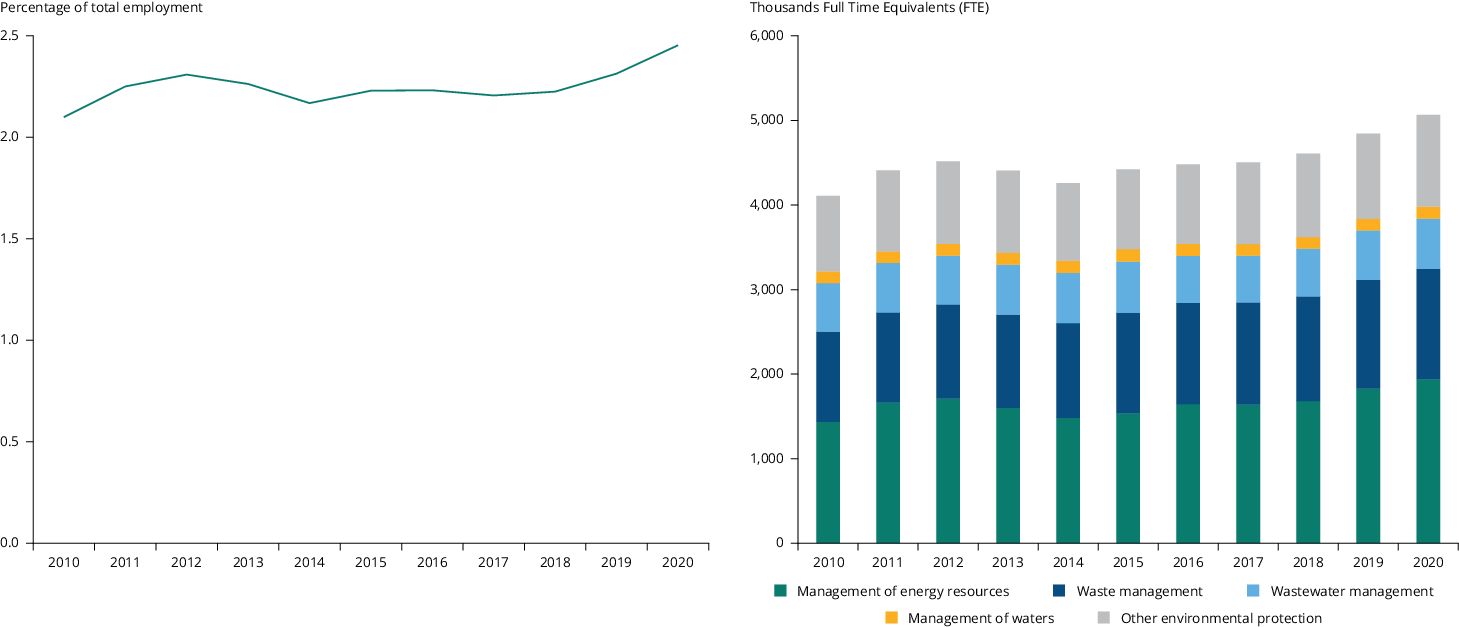The European Green Deal and the Eighth Environment Action Programme (8th EAP) aim to accelerate the green transition of the EU’s economy. The EU’s environmental goods and services sector, also known as the environmental or green economy, produces goods and provides services that are used for environmental protection and resource management activities.
Employment in the EU’s green economy as a share of employment in the EU’s whole economy increased by 0.4 percentage points (or 956,000 full-time equivalents (FTEs)) from 2010 to 2020. This represents an increase of 23%, compared with an increase of only 5% in employment in the EU’s economy as a whole in the same period. This shows that pursuing environmental objectives has the potential to create jobs in the EU.
By 2020, the environmental goods and services sector employed 5.1 million people (in FTEs) in the EU, accounting for about 2.5% of total EU employment. The increase in green employment between 2010 and 2020 was driven largely by an increase of 503,000 FTEs in the number of jobs related to the management of energy resources , for instance jobs related to:
- producing renewable energy
- manufacturing equipment needed to generate renewable energy, such as wind turbines and photovoltaic cells
- manufacturing energy-efficient equipment
- research and development (R&D) activities
- installation, consultancy and management services.
The second largest contributor to the increase in green employment was waste management, with the number of jobs in this domain increasing by 238,000 FTEs over the period. Employment in the wastewater management domain declined, however, while the numbers of jobs remained more or less stable in the environmental protection domain and slightly increased in the management of waters domain.
Steps taken to support the green transition will create more green employment in the EU by 2030, mainly through applying circular economy principles and moving towards a low-carbon economy . It is therefore expected that, through policies, measures and investments, green employment will account for a higher share of total employment in the EU by 2030.
Shares of green employment in total employment increased in all EU Member States between 2014 and 2020 except in Finland and Romania, where shares dropped by 3% and 15%, respectively. The largest increases in percentage terms were reported for Bulgaria (98%), Luxembourg (87%) and Ireland (79%).
The domains that account for most employment in the environmental economy differ between EU Member States. For example, employment in resource management activities (i.e. management of energy and of water resources) made up more than half of total environmental employment in Estonia, Finland, Luxembourg and Sweden in 2020. In contrast, employment in environmental protection activities (e.g. waste and wastewater management activities) accounted for most environmental employment in Belgium and Croatia (78% in both countries) and in Malta (73%) .
Shares of green employment in total employment were highest in Estonia and Finland, with green jobs making up more than 5% of all jobs in these countries in 2020, although the share in Finland had dropped slightly since 2014. Moreover, a share of just below 5% was reported for Luxembourg. The lowest shares, of less of 1.5%, were reported for the Netherlands, Malta, Germany and Belgium.

